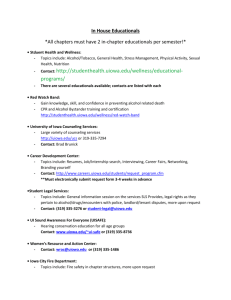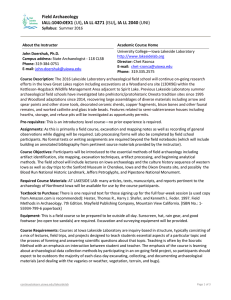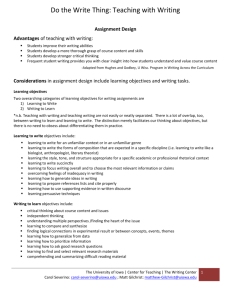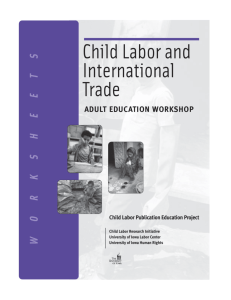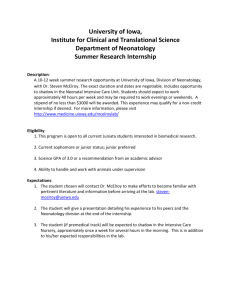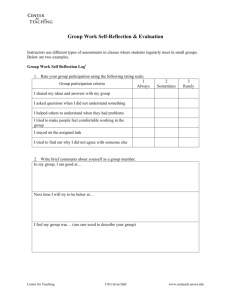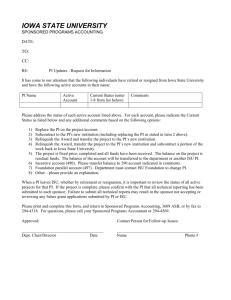Course Profile - Distance and Online Education
advertisement
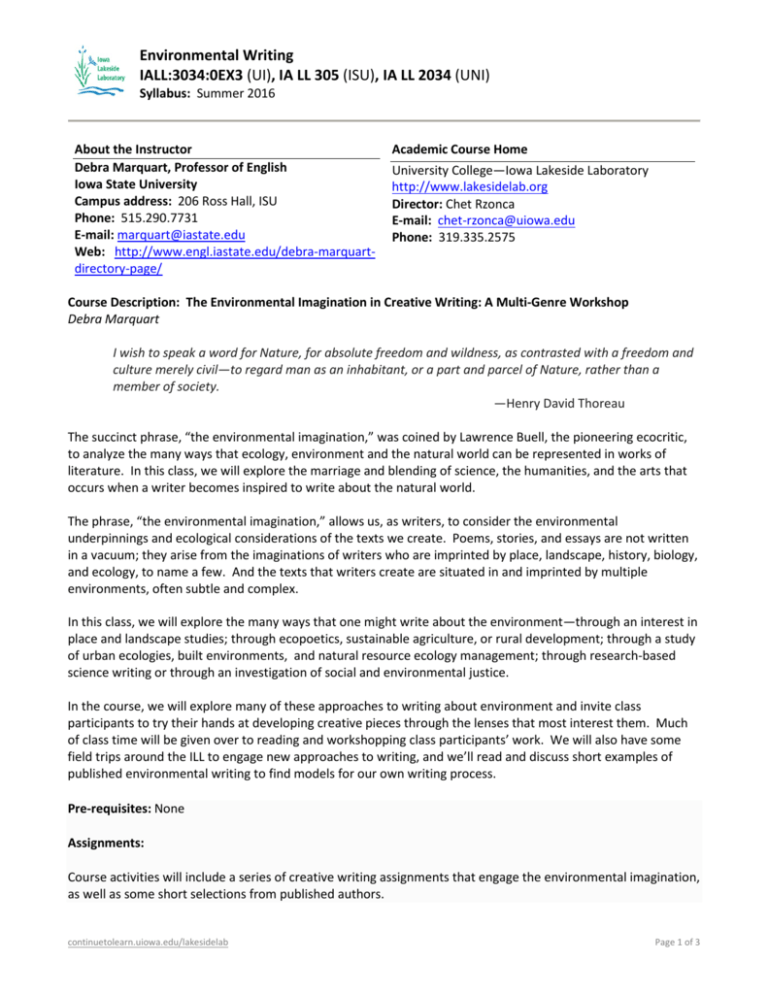
Environmental Writing IALL:3034:0EX3 (UI), IA LL 305 (ISU), IA LL 2034 (UNI) Syllabus: Summer 2016 About the Instructor Debra Marquart, Professor of English Iowa State University Campus address: 206 Ross Hall, ISU Phone: 515.290.7731 E-mail: marquart@iastate.edu Web: http://www.engl.iastate.edu/debra-marquartdirectory-page/ Academic Course Home University College—Iowa Lakeside Laboratory http://www.lakesidelab.org Director: Chet Rzonca E-mail: chet-rzonca@uiowa.edu Phone: 319.335.2575 Course Description: The Environmental Imagination in Creative Writing: A Multi-Genre Workshop Debra Marquart I wish to speak a word for Nature, for absolute freedom and wildness, as contrasted with a freedom and culture merely civil—to regard man as an inhabitant, or a part and parcel of Nature, rather than a member of society. —Henry David Thoreau The succinct phrase, “the environmental imagination,” was coined by Lawrence Buell, the pioneering ecocritic, to analyze the many ways that ecology, environment and the natural world can be represented in works of literature. In this class, we will explore the marriage and blending of science, the humanities, and the arts that occurs when a writer becomes inspired to write about the natural world. The phrase, “the environmental imagination,” allows us, as writers, to consider the environmental underpinnings and ecological considerations of the texts we create. Poems, stories, and essays are not written in a vacuum; they arise from the imaginations of writers who are imprinted by place, landscape, history, biology, and ecology, to name a few. And the texts that writers create are situated in and imprinted by multiple environments, often subtle and complex. In this class, we will explore the many ways that one might write about the environment—through an interest in place and landscape studies; through ecopoetics, sustainable agriculture, or rural development; through a study of urban ecologies, built environments, and natural resource ecology management; through research-based science writing or through an investigation of social and environmental justice. In the course, we will explore many of these approaches to writing about environment and invite class participants to try their hands at developing creative pieces through the lenses that most interest them. Much of class time will be given over to reading and workshopping class participants’ work. We will also have some field trips around the ILL to engage new approaches to writing, and we’ll read and discuss short examples of published environmental writing to find models for our own writing process. Pre-requisites: None Assignments: Course activities will include a series of creative writing assignments that engage the environmental imagination, as well as some short selections from published authors. continuetolearn.uiowa.edu/lakesidelab Page 1 of 3 Iowa Lakeside Laboratory Environmental Writing IALL:3034:0EX3 (UI), IA LL 302 (ISU), IA LL 2034 (UNI) Summer 2016 Course Objectives: Class participants will • • • • • • Learn elements of craft used in creative writing, including use of sensory detail, scene, characterization, dynamic tension, development of theme, use of symbols, images, dialogue, and the management of temporality in a piece of writing. Learn the best practices of working writers. Discover a variety of authors whose work engages issues of the environment, place, ecology, the built environment and the environmental imagination. Write critically about the work of published authors discussed in the classroom setting. Learn techniques and strategies for revision of work to a polished state. Explore the subject of publication, including discussion of publication outlets for short creative pieces as well as book-length projects. Required Course Materials: • • Handout of Shorter Creative Readings for Discussion (to be provided by instructor) Much of class time will be taken up discussing your creative texts, which will be photocopied and delivered to all class members at different points during the class. Textbook to Purchase: • Required Book: John Fowles, The Tree Equipment: • Class members should plan to bring a computer to ILL for use during the term. Course Grade: Course Schedule: A-F Scale May 16 - May 27, 2016 Policies and Instructions: As a registered student in a Distance Education course through The University of Iowa, you are responsible for the policies and instructions posted below. Special Modifications: If you are a person with a disability who requires an accommodation in order to participate in University of Iowa Continuing Education courses or programs, please contact Student Disability Services: 3015 Burge Hall, (319) 335.1462, or sds-information@uiowa.edu, or fax: (319) 335.3973. Reasonable accommodations for students with physical, mental, or learning disabilities will be made. The Division of Continuing Education is committed to both Section 504 of the Rehabilitation Act of 1973 and Section 508 of the Workforce Investment Act of 1998. Academic Misconduct: All forms of plagiarism and any other activities that result in a student presenting work that is not his or her own are academic fraud. All academic fraud is reported to the departmental DEO and the Associate Dean of Continuing Education. All incidents of academic misconduct (plagiarism and cheating) will be continuetolearn.uiowa.edu/lakesidelab 2 of 3 Iowa Lakeside Laboratory Environmental Writing IALL:3034:0EX3 (UI), IA LL 302 (ISU), IA LL 2034 (UNI) Summer 2016 subject to the rules and regulations of the College of Liberal Arts and Sciences as defined and stated in the Academic Policies Handbook (http://clas.uiowa.edu/students/handbook). In this class, students are not allowed to collaborate with others on assignments. Do not share your work with others or ask others to see their completed assignments since both are considered academic misconduct. If you need help, please contact the instructor by email. Students are responsible for understanding this policy; if you have questions, ask for clarification. Understanding Sexual Harassment: Sexual harassment is reprehensible and will not be tolerated by the University. It subverts the mission of the University and threatens the well-being of students, faculty, and staff. Visit this site (http://www.sexualharassment.uiowa.edu/) for definitions, assistance, and the full University policy. Complaint Procedures: If at any time you have concerns about this class or your performance in it, please do not hesitate to contact me. If you do not feel that your concern has been resolved satisfactorily, you may contact the Department Chair (contact information provided at the top of page one of this syllabus). If you still do not feel that your concern has been resolved satisfactorily, you may contact University College, 310 Calvin Hall, (319) 335-1497, uc-academics@uiowa.edu. All complaints must be made within six months of the incident. Administrative Home of the Course: The administrative home of this course is the University College (UC), which governs academic matters relating to the course such as the add/drop deadlines, the second-grade-only option, issues concerning academic fraud or academic probation, and how credits are applied for various graduation requirements. Different colleges might have different policies. If you have questions about these or other UC policies, contact your academic advisor or the Division of Continuing Education, 250 Continuing Education Facility, (319) 335-2575, dce-registration@uiowa.edu. As a registered student in a Distance Education course through The University of Iowa, you are responsible for the policies and instructions as posted online: http://uc.uiowa.edu/students/admitted-university-college-programs/academic-standards. continuetolearn.uiowa.edu/lakesidelab 3 of 3
